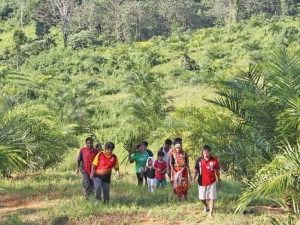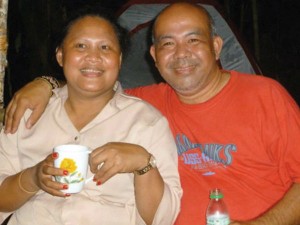Love in the boondocks brings in multimillion-dollar investment

THIS palm oil plantation is expected to earn $10 million for the Manobos in the next five years. BOY CABRIDO
LA PAZ, Agusan del Sur—Love, they say, can move mountains. But can it also bring in a multimillion-dollar investment to a mountain that used to be the battleground for rebellion, conflict and crimes?
That question was posed when a project developer and financing expert fell in love with a Manobo in this region. The answer came quick. No sooner had the the two exchanged vows than an industry that has the potential of boosting the economy of Mindanao rose on high land—literally on top of the mountains of La Paz, Agusan del Sur.
To get there, one has to negotiate 30 kilometers of rough road with no spectacular view—just the forest and the poor communities that earned Agusan del Sur the reputation of being the second most depressed province in the country.
But on top of the mountain, one will find a 120-hectare palm oil plantation with 16,000 full-bearing trees—an estimated 136 trees planted per hectare, each tree measuring almost 2 meters.
This is a product of the love that has blossomed between Manobo supreme chieftain Merlyn Tagleon Coguit and Pedro Francisco Hernandez, now known and addressed by the Manobo tribesmen as Datu Bunanat. The title was given to him by the Manobo Council of Elders to honor his entry into the tribe as a fresh “seedling,” having successfully brought thousands of palm oil nursery plants from Malaysia to their hinterland area.
Bae Merlyn is the first female supreme chieftain of the Manobo tribe, a position she has held since April 2006, three months after her father, the legendary Datu Tagleong, died. The fifth among 17 children, she assumed power on the strength of a unanimous decision of more than 3,000 Manobo tribesmen lead by their Council of Elders.
Hernandez and Bae Merlyn were wed in Manobo rites on the same day she was installed as the first female supreme chieftain.
Love or business?
But which came first, the love story or the business investment?
Both Hernandez and Bae Merlyn agree that theirs was not love at first sight. Hernandez said he fell in love with the Manobo tribe first before Bae Merlyn caught his eye.
“We call him ‘Sir.’ My brothers and sisters told me they met this ‘sir’ who is intelligent and kind and that they brought him to see our father,” Bae Merlyn said in Filipino.
She remains uncertain whether she was smitten all at once with “Sir,” but she described her initial feelings toward him as guarded.
Hernandez, on the other hand, swore that meeting the Manobos was the last thing on his mind.
He was looking for possible projects to fund in Mindanao but to travel to the conflict and security risk areas where the Manobos resided was unthinkable. He said he had been hearing tales of the Manobos’ scheming and treacherous ways. So why mingle with them?
But as fate would have it, he would cross paths with Datu Tagleong.
“Tears streamed down the old man’s face when he saw me. Then he told me in his dialect which I did not understand, ‘Uto mig-abot kad! (It’s good that you finally came),’” Hernandez said.
Datu Tagleong was over 100 years old when Hernandez met him but he was surprised that the old man’s mental and physical faculties were still intact.
“He knows what he wants for his people and he never lost faith that one day, the Manobos will have a better life,” Hernandez said.

LOVE crosses boundaries for Manobo supreme chieftain Merlyn Tagleon Coguit and businessman Pedro Hernandez. PHOTO FROM FACEBOOK
Hernandez, however, lamented the fact that the leader of the Manobo tribe could not even read and write, which was why he did not understand documents he was made to sign.
Rediscovering his roots
Hernandez hails from the Kankanaey tribe of Mountain Province. Spending some time with Datu Tagleong and the Manobo tribe made him rediscover his roots from another indigenous peoples group.
“It was, in a way, acknowledging my bloodline, something I admit I have already forgotten, especially in the years that I lived in the United States,” Hernandez said.
In a short period of time, Hernandez became like a son to Datu Tagleong. Before his death in January 2006, the old man asked Hernandez to help the Manobos find their own voice and strength to determine the course of their future.
“It was an honor, a huge trust. But of course I declined because I am not a Manobo,” Hernandez said.
Datu Tagleong found a way to make Hernandez change his mind by offering his youngest daughter Mary Grace, known as Sudot, to be his wife. But Hernandez had his eyes on someone else, Datu Tagleong’s fourth daughter Merlyn.
Hernandez said he fell for Bae Merlyn because of her strong and commanding presence that she obviously inherited from her father.
“She has the bearing of a leader, strong and benevolent,” Hernandez noted.
It did not take long before Bae Merlyn noticed the extra special attention given to her by Hernandez.
“I saw that he loved my tribesmen first, respected my father and loved me last—that’s what I liked about him,” Bae Merlyn said.
The unexpected love that blossomed between Bae Merlyn and Hernandez that led to a union brought so much joy to the Manobo tribesmen and their leader. But more importantly, it signaled the significant and momentous changes in the lives of the mountain dwellers.
‘Raw diamond’
While Bae Merlyn has the qualities needed in leading her people, these are raw qualities that needed honing and guidance. It was Hernandez who taught Bae Merlyn everything she needed to know as the Manobo’s supreme chieftain.
Hernandez describes Bae Merlyn as a “raw diamond” that has been polished and shaped into the leader her father hoped her to be.
But it was Hernandez’s contacts and experience in banking, project development and financing here and abroad that became the gateway that provided the much needed push for the project take off from practically zero.
Before his involvement with the Manobo tribe, Hernandez worked in various project development and financing for some power and energy related projects in Mindanao during the Ramos administration.
His experience and contacts abroad paved the way for the participation of foreign investors who poured in money and technological skills to maintain a palm oil plantation comparable to those in Malaysia and Thailand.
As early as December 2006, Hernandez started the long and tedious work by corresponding with his contacts abroad, presenting proposals on the land’s potential for business. It took a lot of convincing, especially since no one wanted to take the risk of investing millions of dollars in a troubled region like Mindanao.
Investors eventually saw the viability and sustainability of the project, especially after the potential off-shore based company sent technical agricultural experts to assess the fertility of the land of the Manobos and saw that it was even more ideal than those already existing in Thailand and Malaysia.
Back to farming
The biggest challenge, according to Hernandez, is convincing the Manobos to go back to farming and turn their backs on other sources of income like engaging in illegal logging.
The first batch of germinated palm oil seeds were brought to the Manobo territory in the hinterlands of La Paz in July 2008. The seeds came from a test farm in Thailand.
What followed was a rigorous training on palm oil tree farming, including technical knowledge on maintenance conducted by two palm oil plantation experts, an Australian and a Chinese-Malaysian, according to Hernandez.
He said everything that had happened with the Manobo tribe was the vision of Datu Tagleong.
In the next five years, harvest time is expected and the plantation is anticipating an estimated $10-million in sales from local and international contacts.
“It is time our national leadership be made aware of what a tribe and an indigenous people can do on their own using the very law that has been created to protect, promote and prosper our lives,” Hernandez said.
For her part, Bae Merlyn said the project represented the true worth and capability of her tribe.
“I want other tribes to see that what we have done they can do as well,” Bae Merlyn said.
Bae Merlyn explained that in the olden days, all tribespeople, especially in Mindanao, helped each other through a practice called “hinandugay”—a way of mutual assistance even if they did not belong to the same tribe.
For decades, the Manobo tribe of Mindanao has been searching for a chance to finally take charge of their own destiny. Slowly and steadily, this is taking shape within the vast plantation that has now 16,000 full bearing palm trees.
Mountain people
The Manobos are known as the people of the mountains. They dwell and breathe a life and existence within the mountains, noted Bae Merlyn.
“My people will never be separated from the mountains,” said Bae Merlyn.
According to Bae Merlyn, the Manobo tribe of Tagleong has been used and abused for selfish personal and political interests. She also acknowledged that in the past, even some of their own people became instrumental in taking advantage of the vulnerability of the tribesmen who are until now mostly unschooled and lack formal education.
Bae Merlyn was only the one among her siblings who was able to reach college level—a rare feat in her tribe.
According to her, it’s about time to change the story of the Manobo and it’s a story about how they improved their way of life.
The road toward what is now known as the Datu Tagleong Agro-Forest Complex has been a journey of sacrifices and suffering and also of faith in God and His plan for the Manobos, according to Hernandez.
Hernandez said the Manobos wanted the national government to be aware of what they had accomplished to help protect their livelihood against what he described as the same personal interests that made the past attempts of a better life for the Manobos a failure.
He said the palm oil plantation was threatened by “political and vested interests.” The hinterlands of La Paz is still classified as a conflict and high-risk area because of the presence of armed men believed to be maintained by local politicians.
Two dreams came true—the palm oil plantation and the love between Hernandez and Bae Merlyn—one that blossomed in the mountains and one that moved mountains.
